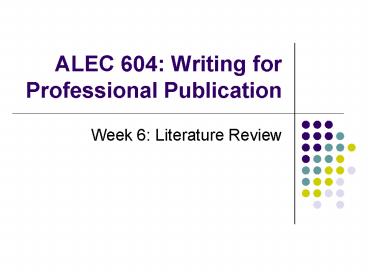ALEC 604: Writing for Professional Publication - PowerPoint PPT Presentation
1 / 18
Title: ALEC 604: Writing for Professional Publication
1
ALEC 604 Writing for Professional Publication
- Week 6 Literature Review
2
Activities
- Collect scholarly journal articles
- Evaluate the contribution of collected articles
- Develop an Introduction for your research
manuscript
3
Scholarly Journal Articles
- How do you know it is a scholarly journal?
- Professors
- Peers
- Web of Science
- Evaluating premier articles
- Outstanding articles selected by editorial boards
- Review the Literature Reviews Guide
- Review the questions in the Journal Article
Review Guide
4
Literature Review
- What question (problem) did you study?
- Should be at the end of your Introduction or
Literature Review - How do you know youve collected the correct
sources for your Introduction? - How do you write a convincing storyline that
leads to asking your question? - Will the introduction lend itself to asking the
stated problem, or reason for your study?
5
Collecting Your Sources
- Important researcher skill from experience
- Reviewing the premier journals in your field
- Writing for the premier journals in your field
- Knowledge is imperfect you cant find it all
- Information overload
- Many papers with many facts not all are relevant
- Locate significant points in each paper quickly
6
Reviewing Articles
- Articles almost always have
- Abstract
- Background (Introduction, Literature Review,
etc.) - Methods
- Results
- Discussion
- Conclusions
- Which are the most important parts to read?
- Which sections should be read first or last?
7
Reviewing Articles my order
- Abstract
- Saves time a must read for relevancy
- Conclusions
- Can be limited to discussion
- Check for integration of other sources
- Methods
- Reliability/validity, non-response, etc.
- Appropriate methods used - How was it studied?
8
Reviewing Articles my order
- Results and Discussion
- What I care about most what was found?
- Is there a logical accounting of all results?
- Background
- Useful if youre new to the subject
- Good trail for other sources
9
Writing a Great Introduction
- Should be a synthesis of your topic of study
- Describes the big picture
- Provides new insights into past questions
- Focused writing produces logical storylines
- Bad introductions are
- Mere collections of quotes stringing studies
- Devoid of critical analysis of previous literature
10
Introduction
- Creates interest
- Uses a funnel organizational approach
- Includes known, unknown, and the question
- Nature and scope of the problem
- Gaps in the literature
- Previous findings
- Pertinent literature
- Hypotheses/research question signals
11
Introduction
- Practice brevity, but leave no logic holes
- Present tense for what is currently true
- Past tense for previous findings
- Past tense to state the question
- Common errors
- Too much background
- No gap in knowledge mentioned
- No question posed
12
How to Signal the Question
- To determine . . .
- The purpose of this study was . . .
- This report describes experiments designed to
determine . . . - Therefore, our objective was to determine . . .
13
Writing an Introduction
- Sample the literature appropriately
- Appropriately depends on your topic
- Familiarity with the topic
- Relevance of the topic in your field of study
- Related literature
- Search depth and breadth
- Too broad and youll have too much to read
- Too narrow and youll lack sufficient support
14
Systematic Organization
- Themes
- Categorize material by relevant themes
- Check each theme against your question
- Will this article help answer my question?
- If the answer is no, discard it!
- Organize the remaining material logically
- Build from general to specific (Deductive)
- Build from specific to general (Inductive)
15
Systematic Organization
- Time
- Build from historical foundation to current
research - Address most current studies and work back to
foundational theory
16
Systematic Foundation
- Dont
- Just summarize what others have written
- Present an annotated bibliography
- Present information just because you have it
- Get attached to tangents
- Dont limit the literature review to one-sided
views
17
Common Mistakes
- Including too little information for the reader
to understand the reason for your question - Including too few references to support the
statements being made - Scattering information without logical order
- Ideas do not flow from paragraph to paragraph
- Ideas are not translated from section to section
18
Summary
- Critical evaluation of sources aids in writing
the introduction for your manuscript - Sufficient scholarly sources help you
- Explain what, Describe how, Reference who,
and Support why your current study is needed - Writing a literature review does not have to be
an unachievable task if appropriate strategies
are used to accomplish it































